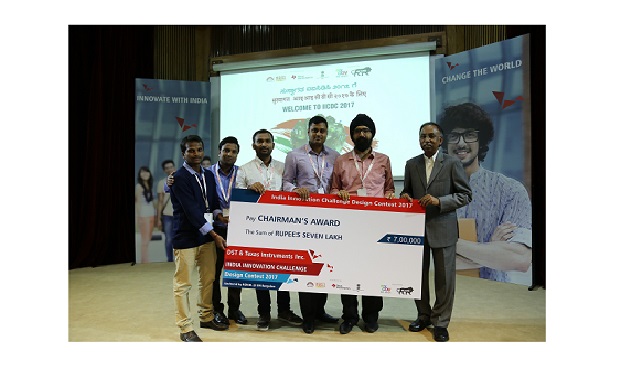Texas Instruments India (TI) announced the top 10 winning teams for the India Innovation Challenge Design Contest 2017 (IICDC 2017), one of India’s most popular design contests for engineering students. The winners qualify for an INR 3.5 crore start-up seed fund from the Department of Science and Technology (DST) and an opportunity to be incubated at IIM Bangalore’s innovation and entrepreneurship hub, N S Raghavan Centre for Entrepreneurial Learning (NSRCEL).
The announcement was made during the grand finale held at IIMB on August 10 (Friday), 2018, in the presence of Dr. S. D. Shibulal, Co-founder of Infosys and Amarendra Sahu, CEO & Co-founder of NestAway Technologies Pvt. Ltd. Dr. Anita Gupta, Adviser and Associate Head, National Science & Technology Entrepreneurship Development Board (NSTEDB), Department of Science and Technology, Ministry of Science and Technology, Government of India, Douglas Phillips, WW Director, University Marketing Program at Texas Instruments, Sanjay Srivastava, Director Marketing, University Program at Texas Instruments, Professor Suresh Bhagavatula, Chair, NS Raghavan Centre for Entrepreneurial Learning at IIMB and Professor Gopal Naik, Dean Faculty, IIMB were also present at the event.
Indian Institute of Technology from Kharagpur, West Bengal secured the Chairman Award for Technical Innovation on ‘Battery Health Management System with Integrated Charger’. Sir M Visvesvaraya Institute of Technology from Bangalore, Karnataka, won the first runners up award for their innovation ‘Underwater and Airborne Unmanned Autonomous Vehicle’ and Bhartiya Vidya Bhavans Sardar Patel Institute of Technology from Mumbai, Maharashtra was adjudged second runners up award on their innovation ‘Health Set’.
TI’s collaboration with IIMB and DST has helped nurture young engineers through this contest. In a yearlong challenge, the participants were mentored by TI and IIMB. TI provided technical resources and guidance throughout the contest, from free tools, technical guidance and mentoring, to helping student develop their prototypes. DST provided funding of INR 3.5 crores to the student start-ups, which went towards the product development process and seed fund. The online platform MyGov, promoted active participation of the students in the contest, helping them register for the contest from all different corners of the country through the MyGov portal.







